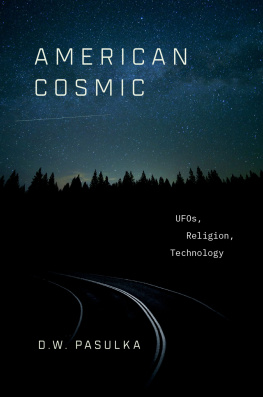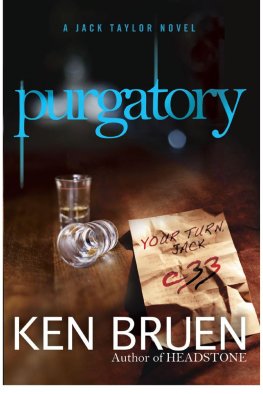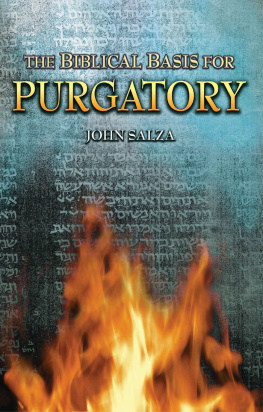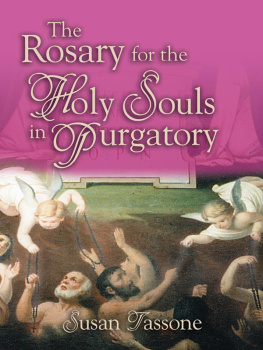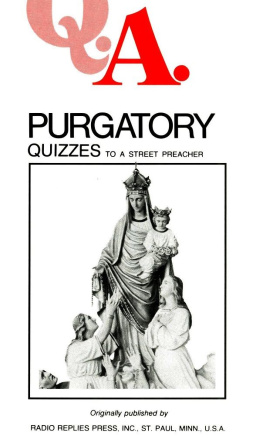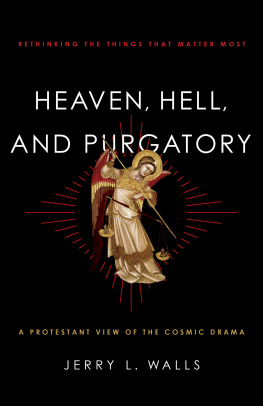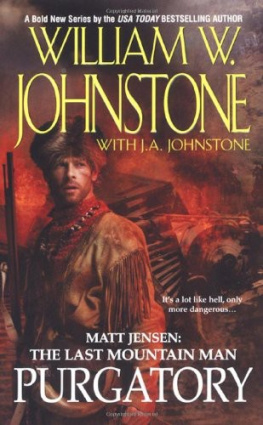Heaven Can Wait
HEAVEN CAN WAIT
Purgatory in Catholic Devotional and Popular Culturez

DIANA WALSH PASULKA


Oxford University Press is a department of the University of Oxford. It furthers the Universitys objective of excellence in research, scholarship, and education by publishing worldwide.
Oxford New York Auckland Cape Town Dar es Salaam Hong Kong Karachi Kuala Lumpur Madrid Melbourne Mexico City Nairobi New Delhi Shanghai Taipei Toronto
With offices in Argentina Austria Brazil Chile Czech Republic France Greece Guatemala Hungary Italy Japan Poland Portugal Singapore South Korea Switzerland Thailand Turkey Ukraine Vietnam
Oxford is a registered trade mark of Oxford University Press in the UK and certain other countries.
Published in the United States of America by
Oxford University Press
198 Madison Avenue, New York, NY 10016
Oxford University Press 2015
Chapter 3 has been adapted from the article The Eagle and the Dove: Constructing Catholic Identity through Word and Image in Early American Catholic Popular Literature, in Material Religion: The Journal of Arts, Objects and Belief. Berg Publishing, November 2008. Used with permission.
All rights reserved. No part of this publication may be reproduced, stored in a retrieval system, or transmitted, in any form or by any means, without the prior permission in writing of Oxford University Press, or as expressly permitted by law, by license, or under terms agreed with the appropriate reproduction rights organization. Inquiries concerning reproduction outside the scope of the above should be sent to the Rights Department, Oxford University Press, at the address above.
You must not circulate this work in any other form and you must impose this same condition on any acquirer.
Library of Congress Cataloging-in-Publication Data Pasulka, Diana Walsh.
Heaven can wait : Purgatory in Catholic devotional and popular culture / Diana Walsh Pasulka. pages cm Includes bibliographical references and index. ISBN 9780195382020 (hardcover : alk. paper) ISBN 9780199700424 (ebook) ebook ISBN 9780190210816 1. PurgatoryHistory of doctrines. 2. Sacred space. 3. Catholic ChurchDoctrines. 4. Purgatory. 5. Popular cultureReligious aspectsCatholic Church. I. Title.
BT843.P37 2014
236'.509dc23 2014011175
1 3 5 7 9 8 6 4 2
Printed in the United States of America
on acid-free paper
To my husband, Daniel; my mother, Heather Walsh; and my brothers, Daniel and Dennis. Thank you for the conversations and inspiration.
Contents
DURING THE TIME period that I wrote this book, I experienced several life events, including having children and earning tenure at my university. I would like to acknowledge the support provided by my family, colleagues, and students, and the people whom I met while doing research. I would first like to thank Cynthia Read, who has been a very positive, patient, and helpful editor and guide during the process of writing the book. I am very grateful to the anonymous reviewers of the early manuscript for their insightful comments. I traveled far out of my historical area of research in the first two chapters of the book, and I owe a debt of gratitude to Isabel Moreira, whose own work on purgatory proved my invaluable guide through the complex theological worlds of late antiquity and the early medieval eras. I would also like to thank Dr. Moreira for her generosity and for providing helpful comments on these sections of the manuscript that resulted in several crucial adjustments. As I finished writing my manuscript I read Jeffrey J. Kripals book Authors of the Impossible: The Paranormal and the Sacred (Chicago: University of Chicago Press, 2010). It influenced the way I thought about my research on the Catholic supernatural and motivated me to edit parts of my manuscript to reflect my deepened understanding. My students have made my journey fun and interesting. Jamie Brummitt, Everett Fulmer, Kerry Sullivan, Eugene ODea, Garrison Libby, and Bryan Hendershot helped me collect archival material. My former student Hope Bordeaux read parts of the manuscript and provided valuable feedback, and Christopher Moreland offered helpful comments and suggestions on the introduction to the book.
My colleagues at the University of North Carolina Wilmington were instrumental in providing me with the time and resources I needed to finish the manuscript. I am grateful to David Webster and George Zervos, and the University of North Carolina Wilmington for assisting me in securing a sabbatical leave in the fall 2013, which allowed me time to finish. My colleagues Patty Turrisi, Walter Conser, and Teddy Burgh provided intellectual support. My colleague Herbert Berg helped me navigate through several theoretical problems. George Zervos has been a very supportive chair, and I thank him for that. I am grateful to the Honors College at the University of North Carolina and Kate Bruce for providing the support that my students needed to engage in research with me. I would also like to thank William A. Christian Jr., whose writings on visionaries helped frame my approach to my subject, and who provided moral support at the very end of the project, typically when I needed it most.
I have met wonderful people who have shared their experiences and perspectives with me. Susan Tassone is a remarkable person and researcher. Several ministers of the purgatory apostolates, including Mike Humphrey and Brian Bagley, were generous with their knowledge. I am also grateful to the members of the Ark of the Covenant, who provided encouragement and support. The archivists at the Philadelphia Archdiocese Historical Research Center were incredibly helpful in locating periodicals and pamphlets. Poet and teacher Sarah Messer helped me discover the beauty of my subject by directing my attention to the elements of medieval purgatory: fire, water, stone. During the last months of this project I met screenwriters Chad Hayes and Carey Hayes. Their fascination with purgatory inspired me and helped me understand purgatorys timeless appeal for artists and authors of all kinds.
Finally, I would like to thank my family. This book could not have been written without the help of my husband, Daniel, who took care of the home hearth while I disappeared into the cave of a computer screen. My mother, Heather Walsh, helped me conduct archival research in Charleston, South Carolina, while I was seven months pregnant with twins. She deserves special thanks for that trip. My brothers Daniel and Dennis have always inspired me and I look forward to many future conversations with them about philosophy and religion. I am indebted to Marcia Czopek, Bill and Melanie Pasulka, and Joe and Linda Pasulka for sharing their memories of pre-Conciliar Catholicism. Thank you, Joe Pasulka, for reading parts of my early manuscript and for offering editorial comments. I would like to thank my sister-in-law, Brigid Pasulka, who was the best of sports while accompanying me on several research adventures. My children are too young to read this book, and will be for several years to come. However, when they do read it, and if they do, I hope that they know that I dedicate all of my work to them, with love.


